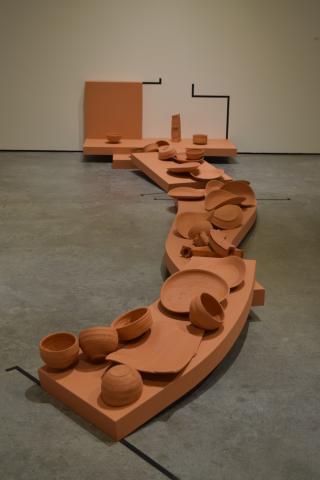Structure and content
Review the required courses and course descriptions for the graduate program.
|
Semester 1 |
Semester 2 |
Semester 3 |
Semester 4 |
Semester 5 |
|---|---|---|---|---|
|
Graduate |
Graduate |
Graduate |
Graduate |
Graduate |
|
Historical Craft 3 credits |
Research 3 credits |
Elective |
Elective |
THESIS PROJECT |
|
Craft Discourse II – Professional Direction |
Craft |
|
Emerging Craft |
|
|
12 Credits |
12 Credits |
12 Credits |
12 Credits |
12 Credits |
Course Descriptions
CRSM621 Craft Discourse I
Craft Discourse I is a seminar examining craft in a contemporary context. The seminar introduces students to key themes on craft drawn from critical and theoretical inquiry in visual culture, material culture and art history. Readings, discussion, presentations, and written assignments provide the means to foster critical and reflective engagement.
CRPR660 Craft Discourse II – Professional Direction
Craft Discourse II addresses the development of skills that support a professional career in the arts. The course introduces graduate students to inquiry and methods addressing teaching in a studio-based learning environment, as well as skills and knowledge necessary to support a creative practice, such as approaches to studio-based learning & teaching, grant-writing and entrepreneurial skills.
CRAH630 Historical Craft Discourse
Historical Craft Discourse is a seminar course introducing graduate students to writing on Canadian and Global craft history. Students will undertake archival inquiry and oral history research to develop an understanding of the historical context of craft in relation to their practice. The seminar supports critical reflection and knowledge sharing through creative inquiry, seminar discussion, presentations and written assignments.
CRSM623 Craft Discourse III – Emerging Craft Discourse
Craft Discourse III continues an examination of contemporary craft practice and discourse begun in Craft Discourse I in relation to a graduate students own studio work and research. The course provides a context for ongoing dialogue and self-reflection, and preparation of a draft of the Thesis Paper.
Graduate Studio I-V
-
Provide an intensive and supportive environment to experiment, explore and discover new relationships between materials, technical processes and creative methodologies.
-
Facilitate intensive, self-directed studio-based inquiry that encourages critical reflection and dialogue through formal discussion (critique) and the presentation of the work.
-
Provide an opportunity for ongoing refinement of a body of creative work that seeks to synthesize the material, technical and creative basis of studio-based inquiry.
CRST611 Graduate Studio I
Graduate Studio I initiates a process of studio-led inquiry that forms the basis for the student’s Thesis Project. This course provides the opportunity for experimentation and exploration of the critical application of knowledge in their practice. Working with an Interim Supervisor the student will also produce the first iteration of their Research Plan, a living document that will evolve throughout the student’s program.
CRST612 Graduate Studio II
In Graduate Studio II, the student will refine a body of creative work that synthesizes studio activity with ongoing research. This course encourages critical reflection and refinement of the student’s goals for studio-led inquiry. Students will use Graduate Studio II to develop and define their Thesis Project articulating a research position and its corollary methodologies in a finalized Research Plan* in preparation for the Mid-Program Review. Students will also participate in a work-in-progress exhibition with their cohort.
CRST613 Graduate Studio III
Graduate Studio III facilitates intensive, self-directed studio activity as defined in the student’s Research Plan. In this course the student will produce a significant body of work that evinces sustained studio-led inquiry and critical reflection on the methodologies undertaken. The work produced will clarify and refine the student’s Research Plan* and inform the overall Thesis Project.
*The Research Plan is a living document that will evolve throughout the student’s program.
CRST614 Graduate Studio IV
In Graduate Studio IV, the student will initiate an original body of work that critically engages with a defined research position while evincing effective theoretical and methodological approaches. Studio activity in this course focuses on the initiation of a discrete body of work that functions as a key site of critical thought and inquiry, in order to produce and engage with new forms of knowledge explicit in the final Thesis Project.
NOTE: Studio praxis will inform the supporting Thesis Paper written for CRSM.623 Thesis Project Seminar. The Thesis Paper is intended as a supporting document for the final Thesis Project and will be reviewed by both the seminar instructor and the Principal Supervisor. This collaborative approach necessitates shared critical encounters with the studio work for both the Principal Supervisor and instructor of CRSM.623.
CRST615 Graduate Studio V
Graduate Studio V is the final studio course and the cumulative learning experience of the program. The student will work intensively to complete and defend a Thesis Project (consisting of a Thesis Exhibition, Thesis Paper and Oral Defence) that critically engages with a defined research position while evincing effective theoretical and methodological approaches in order to produce and engage with new forms of knowledge.
CRRM640 Research Methods
Research Methods is a course that is designed to support the development of graduate students’ studio-based inquiry. Different methods of creative and critical inquiry will be introduced to students in response to ongoing dialogue about their practice. This dialogue will be sustained through seminar discussions, one-on-one meetings, the presentation of studio work, and written assignments that support experimentation and self-reflection.
Electives
In consultation with your Principal Supervisor, students will propose two elective courses in support of the development of their Thesis Project. They may be organized in several ways, as either an independent study, an AUArts 300-400 level course which is elevated to a graduate-level credit, a 400 or graduate level academic course at another institution, a professional internship, or an artist residency.
